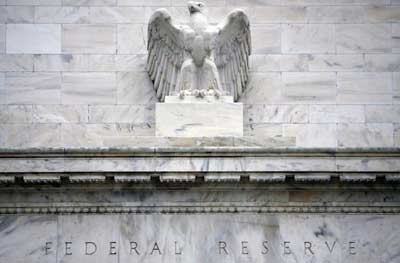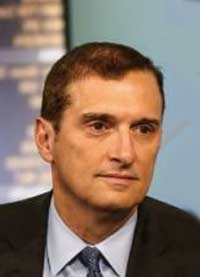Blame the Fed for the Disconnect in Markets
Jim Bianco
 British economist Charles Goodhart observed in the mid-1970s that “when a measure becomes a target, it ceases to be a good measure.” Some 45 years later, Goodhart’s Law is at the center of a fierce debate in financial markets over whether governments and central banks turned riskier assets such as equities into targets. And if so, are markets no longer measures of the economy? British economist Charles Goodhart observed in the mid-1970s that “when a measure becomes a target, it ceases to be a good measure.” Some 45 years later, Goodhart’s Law is at the center of a fierce debate in financial markets over whether governments and central banks turned riskier assets such as equities into targets. And if so, are markets no longer measures of the economy?
Small investors seem to have figured out that the Federal Reserve has, indeed, targeted markets through its unprecedented stimulus programs. They know that markets are now designed for investors to win, as evidenced by the S&P 500 Index’s about 43% gain since late March despite the worst economic recession since the Great Depression. Dave Portnoy, the founder of the website Barstool Sports who recently took up day trading, recently explained it best:
“It took me a while to figure out that the stock market isn’t connected to the economy,” he said. “I tell people there are two rules to investing: Stocks only go up, and if you have any problems, see rule No. 1.”
If markets no longer have moorings to the economy, then investment money lacks consequences and purposely acts aggressively to a point that seems reckless. This further enhances its impact on markets.
Make no mistake, small investors are a significant influence on markets. Bloomberg News reported Tuesday that day traders opened record new trading accounts in the first quarter, likely lured by zero trading fees, a historic selloff in equities and probably boredom while stuck at home. Speculation among small investors has risen to at least the bubble days of the dot-com boom of 1999. The online broker Robinhood reports that one-third of its accounts, which now total more than 14 million, were opened this year, with the bulk of these newbies joining since early March, when the Fed began supporting financial markets in moves that have expanded its balance sheet assets by almost $3 trillion to $7.17 trillion. Money manager Jeffrey Gundlach speculated this week on a webcast that people are using stimulus checks from the government to buy stocks.
The Fed justifies its actions, which primarily centers on injecting money directly into financial markets by purchasing bonds, by turning the argument around and saying the economy ultimately reflects markets. This is known as the “wealth effect” that was championed by former Fed chairman Alan Greenspan a generation ago. Current Fed Chairman Jerome Powell explained this thinking just a few weeks ago in reference to troubled companies:
“If a company like that doesn’t have market access and can’t roll over its debt and can’t have enough cash on hand to deal with its obligations, what they’re going to do is they’re going to lay people off. … So, by announcing our facility and including those companies, the ones who actually need the credit … now [have] lots of cash on their balance sheets.”
So, what if free markets do not want to finance companies with shaky operations? The Fed has decided it will effectively nationalize debt markets by removing the risk for investors so that these companies can get the funds to continue operating. In the Fed’s way of thinking, higher and vibrant markets create and save jobs.
To be sure, that is what largely happened after 2008 financial crisis as the central bank began buying bonds under a policy known as quantitative easing. A steep price was paid. While the economy grew for almost 11 years in the longest expansion on record, annualized growth was below average. This was attributable to an economy that had become less flexible and more reliant on stimulus.
Another consequence was laid out by former Federal Reserve Bank of New York President and fellow Bloomberg Opinion contributor Bill Dudley last week:
The Fed’s choices: not have a recovery, have less inequality; or have a recovery with buoyant financial asset prices and more inequality.
This is the legacy of the bank bailouts that followed the financial crisis and the consequence of the “all-in” actions by the Fed in recent months. Which is why in this monetary policy regime, no bet seems unwise, even buying the shares of bankrupt rental car companies after they already have risen 1,000% in a week. But to keep the game going, the Fed will need to keep its policies in place in perpetuity. Then again, the Fed might wonder why it would ever end them if they increase the wealth of 60% of the nation that owns stocks and supposedly create jobs without inflation.

Jim Bianco is the President and founder of Bianco Research, a provider of data-driven insights into the global economy and financial markets. He may have a stake in the areas he writes about.
www.bloomberg.com
| 



